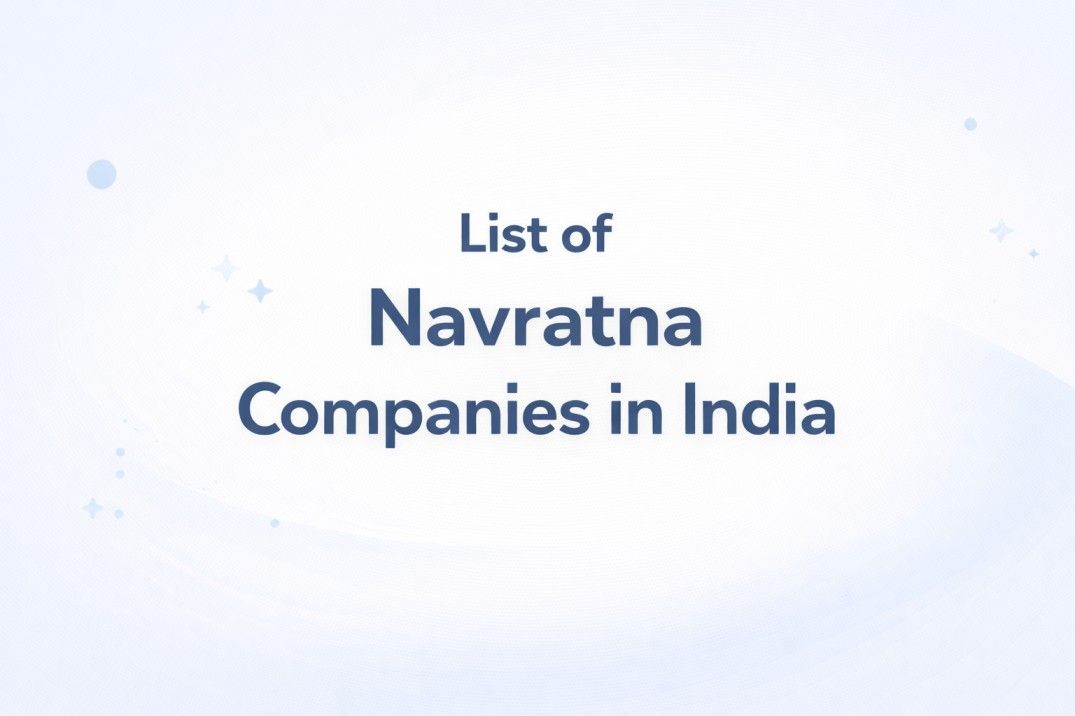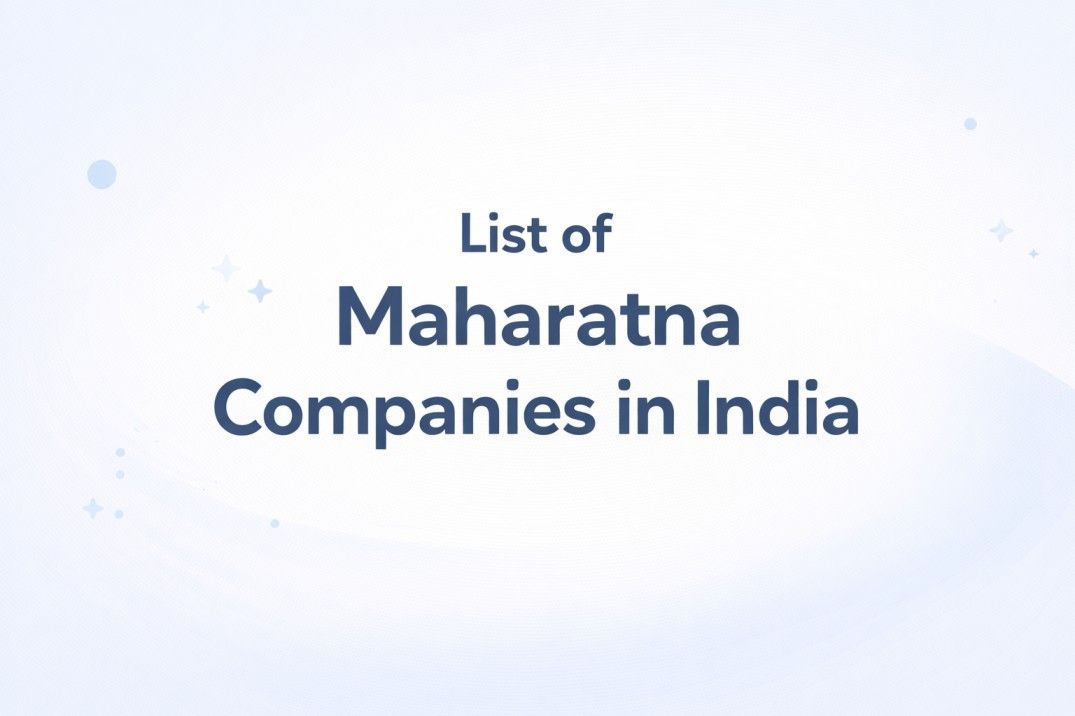What Is IPO

- Published Date: May 17, 2024
- Updated Date: January 06, 2026
- By Team Choice
Ever noticed how a company’s name suddenly dominates news headlines when it launches an IPO? From tech startups to established Indian businesses, Initial Public Offerings (IPOs) often attract massive attention from investors.
In this blog, you’ll learn what is IPO, how it works in the Indian stock market, its process, advantages, disadvantages, SEBI rules, and whether IPO investment is suitable for beginners.
What are Initial Public Offerings?
An IPO (Initial Public Offering) is the process through which a private company offers its shares to the public for the first time. By doing this, the company gets "listed" on major stock exchanges like the NSE (National Stock Exchange) or BSE (Bombay Stock Exchange).
Simply put, an IPO is the transformation of a privately owned company into a publicly traded one. When you buy shares during an IPO, you are buying them directly from the company, making you a part-owner (shareholder).
What does IPO stand for?
The full form of IPO - Initial Public Offering
Is it different from regular stock trading?
Yes. If you are wondering what is IPO in share market context, think of it as the Primary Market. It is the first opportunity for the general public to invest in a company’s shares before they move to the Secondary Market (the regular stock market).
- In an IPO: You buy shares directly from the company at a fixed "Issue Price."
- After the IPO: The shares trade on the exchange, and the price fluctuates every second based on how many people want to buy or sell them.
A Brief History of IPOs: From 1602 to Digital India
The concept of an IPO isn't new; it has evolved over centuries to become the powerhouse of wealth creation we see today.
1. The Global Beginning (1602):
Globally, the IPO journey began over 400 years ago. The Dutch East India Company was the first to issue shares to the public in 1602. They even created the world’s first stock exchange in Amsterdam so people could trade those shares.
2. The Indian Journey:
While India had stock markets since the 1800s (BSE is the oldest in Asia), the IPO "boom" didn't happen until the 1991 Economic Reforms.
- Pre-1991: Before SEBI took charge, the government had an office called the Controller of Capital Issues (CCI). They decided on the price of an IPO. This often meant shares were priced very low, making it hard for companies to raise enough money.
- Post-1991: The government abolished the CCI and gave SEBI (Securities and Exchange Board of India) statutory powers in 1992. This allowed companies to price their own shares (Free Pricing) based on demand, leading to the entry of giants like Infosys (1993) and HDFC Bank (1995).
3. The Digital Revolution:
The history of IPOs is also a history of technology. We moved from physical share certificates to Demat (Dematerialised) accounts in the late 90s. SEBI introduced ASBA (Application Supported by Blocked Amount). This was a historical milestone because it ensured that an investor's money never leaves their bank account unless they actually get the shares.
Types of IPOs in India
There are different types of IPOs based on company size and issue structure:
1. Mainboard IPO:
These represent the "big players" of the Indian market. Mainboard IPOs are issued by large, established companies that meet SEBI’s strict criteria, including a three-year track record of profitability.
For retail investors, the entry barrier is low, with a minimum investment typically ranging between ₹14,000 and ₹15,000 per lot. Once listed on the main platforms of the NSE or BSE, these stocks offer high liquidity and are easily traded by millions of investors daily.
2. SME IPO (Small and Medium Enterprises):
If you’re asking what are SME IPO, these are IPOs by small and medium enterprises listed on SME platforms of NSE or BSE, usually with lower investment amounts but higher risk. For a beginner, the most critical thing to know is that SME IPOs are not "mini" versions of regular IPOs; they are much more expensive and risky.
- The minimum investment is now at least ₹2 Lakhs per lot (double the previous limit). There is no longer a small "Retail" category; you must apply as an "Individual Investor" with a minimum of 2 lots.
- You cannot buy or sell single shares. You must trade in fixed lots (e.g., 1,000 shares). This makes these stocks "illiquid" - meaning it can be very difficult to find a buyer when you want to exit.
- These companies have shorter track records and much higher volatility. While "Listing Gains" can be massive, the risk of losing your entire principal is significantly higher than in Mainboard IPOs.
3. Fixed Price Issue:
This is a straightforward, "take it or leave it" method. In a Fixed Price IPO, the company and its bankers evaluate the business and set a specific, non-negotiable price (e.g., exactly ₹150 per share) before the IPO opens. Investors simply decide how many lots they want at that exact price. While less common today, it is still used by some smaller companies to keep the process simple.
4. Book Building Issue:
This is the most popular method used by modern companies. Instead of a single price, the company provides a Price Band (e.g., ₹500 to ₹510).
- Bidding: Investors "bid" for shares within this range. The final "Issue Price" is decided based on the demand received during the 3-day window.
- Cut-off Price: When applying, you will see an option to bid at the "Cut-off Price." Checking this box means you are willing to pay whatever the final price ends up being.
Pro Tip for Beginners: To increase your chances of allotment, always select the "Cut-off Price" (the highest price in the band). If the final price is lower, the extra money is refunded to you.
What is the IPO Process in India?
Understanding what is the IPO process in India helps investors make informed and confident investment decisions. The IPO process is regulated by SEBI and follows a structured, time-bound framework.
It can be broadly divided into three stages:
Stage 1: Pre-Issue Preparation (Company Side)
- Appointment of Merchant Bankers: The company appoints SEBI-registered merchant bankers, also known as Book Running Lead Managers (BRLMs). These intermediaries are responsible for due diligence, valuation, regulatory compliance, and overall management of the IPO.
- Filing of Draft Red Herring Prospectus (DRHP): The company files a Draft Red Herring Prospectus (DRHP) with SEBI. This document contains comprehensive information about the company, including its business model, financial statements, risk factors, and the purpose of raising funds.
- SEBI Review and Approval: SEBI reviews the DRHP to ensure full disclosure and investor protection. After addressing SEBI’s observations, the company received approval to proceed with the public issue.
Stage 2: Issue Opening and Bidding (Investor Side)
- Announcement of Price Band and RHP: The company announces the price band within which investors can bid for shares. At this stage, the final prospectus is known as the Red Herring Prospectus (RHP).
- Anchor Investor Bidding: One working day before the IPO opens for the public, a portion of shares is allotted to Anchor Investors, primarily institutional investors, which helps establish price confidence.
- IPO Opens for Subscription: The IPO is open for retail investors, non-institutional investors, and institutional investors for a period of three working days.
- UPI Mandate and ASBA Mechanism: Retail investors apply through the ASBA (Application Supported by Blocked Amount) facility. Upon application, investors must approve a UPI mandate, which blocks the application amount in their bank account without deducting it.
Stage 3: Allotment and Listing (Post-Issue Phase)
- Finalisation of Basis of Allotment (T+1): Within one working day of IPO closure, the Basis of Allotment is finalised. Investors are informed through SMS or email regarding the allotment status.
- Credit of Shares and Release of Funds (T+2):
- If shares are allotted, they are credited to the investor’s Demat account, and the blocked funds are debited.
- If shares are not allotted, the blocked amount is released back to the investor’s bank account.
- Listing on Stock Exchange (T+3): On the third working day, the company’s shares are listed on the NSE and/or BSE, enabling investors to trade the shares in the secondary market. Investors may choose to hold the shares for the long term or sell them on the listing day.
Advantages and Disadvantages of an IPO
Understanding IPO advantages and disadvantages is essential before making an investment decision.
| Advantages | Disadvantages |
|---|---|
| Investors can buy shares at the issue price before the company is listed, offering long-term upside if the business performs well. | Strong demand may lead to aggressive pricing, causing some IPOs to list at a discount. |
| Well-subscribed IPOs often list at a premium, enabling short-term gains for investors. | IPOs lack historical trading data, making performance analysis difficult. |
| Retail allotment follows a SEBI-regulated lottery process, ensuring equal opportunity. | Popular IPOs may result in zero allotment despite high demand. |
| SEBI mandates detailed disclosures in the DRHP, improving transparency for investors. | Prices may fluctuate sharply after listing, especially when anchor lock-in periods end. |
How Does an IPO Differ from Regular Stock Market Investing?
Although both involve purchasing company shares, the underlying investment mechanisms differ significantly.
| Parameter | IPO Investment (Primary Market) | Regular Trading (Secondary Market) |
|---|---|---|
| Stage of Investment | Buying "First-Hand" directly from the company before listing. | Buying "Second-Hand" from other investors after listing. |
| Price Discovery | Determined via Book Building (Bidding within a Price Band). | Determined in real-time by Demand & Supply on the exchange. |
| Historical Data | No price history. You must rely on the DRHP/Prospectus financials. | Years of charts, price patterns, and historical performance available. |
| Allotment Certainty | Not Guaranteed. In oversubscribed IPOs, shares are allotted via lottery. | Guaranteed. You can buy any number of shares instantly. |
| Transaction Costs | Zero Brokerage. Most Indian brokers don't charge for IPO applications. | Brokerage + Taxes. You pay brokerage, STT, and GST on every trade. |
| Liquidity | Low. Your money is blocked for ~3 days until listing. | High. You can enter or exit a position within seconds during market hours. |
| Settlement Cycle | T+3 Days. Listing happens 3 working days after the IPO closes. | T+1. Shares are credited to your account within 24 hours of buying. |
Which one should you choose?
- Choose IPOs if: You are looking for "Listing Gains," want to back a company from its early public days, and have the patience for the allotment lottery.
- Choose Regular Trading if: You prefer having control over your entry price, want to use technical analysis (charts), and need the flexibility to sell whenever you want.
How to Research an IPO: A Simple 3-Point Checklist
1. Read “Objects of the Issue”: Check why the company is raising money.
- Growth & expansion: Positive
- Debt repayment only: Caution required
2. Compare P/E Ratio: Check if the IPO valuation is cheaper or more expensive compared to listed competitors.
3. Check Oversubscription: If QIBs (institutions) heavily subscribe, it often signals confidence in the company.
Who Can Invest in an IPO?
To invest in an IPO in India, you don't need a massive bank balance or years of experience. You just need to fall into one of the following categories and meet the documentation requirements.
1. The Investor Categories:
SEBI divides investors into different buckets to ensure fair allotment. Your category depends on how much money you are putting in:
a) Retail Individual Investors (RIIs): This is for most of us. If you apply for shares worth up to ₹2 Lakhs, you are a retail investor. You get the advantage of bidding at the "Cut-off Price."
b) Non-Institutional Investors (NIIs) / HNIs: If you apply for more than ₹2 Lakhs, you are an HNI. In 2025, this is further split into:
- Small NII (sNII): Bids between ₹2 Lakhs and ₹10 Lakhs.
- Big NII (bNII): Bids above ₹10 Lakhs.
c) Qualified Institutional Buyers (QIBs): These are large institutions like Mutual Funds, Banks, and Insurance companies.
2. Can "Special" Groups Invest?
a) NRIs (Non-Resident Indians): Yes! NRIs can invest in Indian IPOs using their NRO or NRE accounts. Most apply through the NRO route as it's more widely accepted by issuers.
b) Minors (Children): Yes, a parent or legal guardian can apply for an IPO in the name of a minor. The minor must have their own PAN card, Demat account, and Bank account.
c) HUFs (Hindu Undivided Families): Yes, a Karta can apply on behalf of the HUF using the family's PAN and Demat details.
Key SEBI Rules for IPOs
SEBI regulates IPOs in India to ensure transparency, fairness, and investor protection, particularly for retail investors. The following are some of the most important SEBI rules applicable in 2025.
1. Mandatory T+3 Listing Timeline:
SEBI mandates that IPOs must be listed within three working days (T+3) from the issue closing date. Funds remain blocked for a shorter period, and refunds for non-allotment are processed quickly.
2. Stricter Anchor Investor Lock-in Periods:
Anchor investors, typically large institutions, are subject to phased lock-in period requirements.
Rule:
- 50% of anchor shares locked in for 30 days
- Remaining 50% locked in for 90 days
Purpose: Reduces the risk of sharp post-listing sell-offs and improves price stability for retail investors.
3. Regulation of “Objects of the Issue”:
Companies must clearly define how IPO proceeds will be used.
Rule:
- Allocation to “General Corporate Purposes” (GCP) is capped at 25% of the total issue size.
- For SME IPOs, the limit is stricter at 15% or ₹10 crore, whichever is lower.
- Companies are also required to appoint a Monitoring Agency to track fund utilisation.
4. Enhanced Safety Norms for SME IPOs:
To strengthen investor protection in SME IPOs, SEBI has introduced additional eligibility criteria:
- Higher minimum issue size thresholds
- Mandatory price bidding (no cut-off option)
- Profitability requirement: minimum operating profit in at least two of the last three financial years
Future of IPOs in India
The outlook for Initial Public Offerings (IPOs) in India remains strong as we move further into 2026. Several trends are shaping what lies ahead for companies and investors alike:
1. Continued Growth Driven by Economic Expansion:
India’s expanding economy, rising corporate profitability, and increasing entrepreneurship are likely to support a steady flow of IPOs. Sectors such as technology, fintech, renewables, health tech, and manufacturing are expected to dominate future listings.
2. More SME and Startup Listings:
With SEBI’s renewed focus on investor protection and eligibility norms, SME IPOs and listings from early-stage enterprises may increase, but with more stringent filters to ensure quality and financial discipline. This could bring a wider range of investment opportunities while reducing speculation.
3. Greater Participation from Retail Investors:
Improved accessibility through UPI-based IPO applications, investor education initiatives, and simplified subscription mechanisms will likely encourage more first-time and retail investors to participate in public offerings.
4. Enhanced Disclosure and Governance Standards:
SEBI’s ongoing emphasis on transparency, risk disclosure, and accountability, especially in DRHP filings, will continue to raise the overall quality of IPOs. Investors can expect better clarity on company fundamentals and the use of proceeds.
5. Rise of Strategic Listings and Cross-Border Capital Flows:
Companies may pursue IPOs not just for capital, but to build brand credibility, acquire strategic partners, and access global capital. We may also see more cross-border listings or ADR/GDR routes from Indian firms aiming for international investor bases.
6. Tech-Driven Market Infrastructure:
Advances in digital infrastructure, such as faster ASBA processing, UPI mandates, and blockchain-based settlement innovations, could improve the IPO experience, reduce settlement delays, and enhance investor confidence.
Conclusion
IPOs offer investors an opportunity to participate in a company’s growth at an early stage, but they also come with higher uncertainty compared to regular stock market investing. Understanding what an IPO is, how the IPO process in India works, the SEBI regulations, and the advantages and risks involved is essential before investing.
For beginners, the key lies in focusing on fundamentals over hype, reading the prospectus, evaluating valuations, and aligning investments with long-term financial goals. While IPOs can deliver attractive listing gains, sustainable returns are more likely when investment decisions are informed, disciplined, and patient.
FAQs
1. Is it good to invest in an IPO?
Yes, if the company has strong fundamentals, a reasonable valuation, and long-term growth potential.
2. Is IPO risk-free?
No. IPOs involve market risk and listing volatility.
3. Is IPO safe for beginners?
Yes, if beginners focus on mainboard IPOs, use ASBA/UPI, and research properly instead of following hype.
4. How do I get a 100% IPO allotment?
There is no guaranteed way. However, the only legitimate method to increase chances is applying through multiple Demat accounts under different PAN cards (for example, family members). Note: It does not guarantee allotment; however, it may enhance the likelihood of allocation.
Recommended for you

List of Navratna Companies in India

List of Maharatna Companies in India

FII DII Data - Live Data
